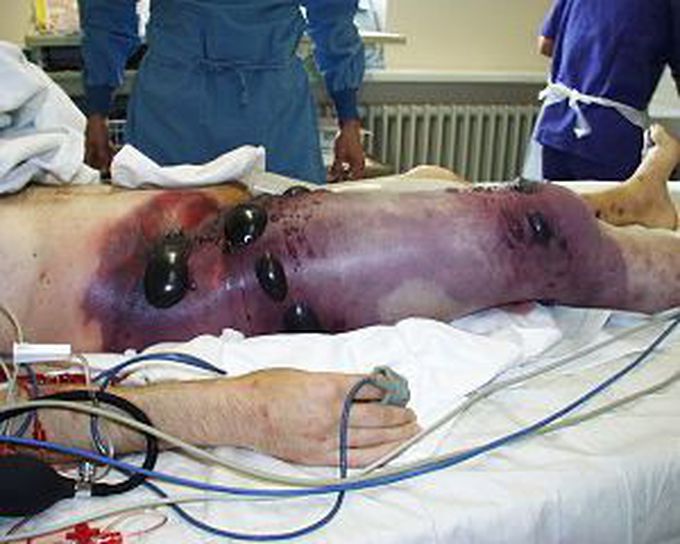


Gas Gangrene
Gas gangrene is a bacterial infection caused by Clostridium perfringens. The characteristic features of gas gangrene are tissue death or necrosis along with gas production. Other features includes: purple or black coloured bubble lesions, foul smelling discharge, fever, pain, blisters and subcutaneous air. Untreated cases may progress to sepsis and ultimately death. Picture credits: https://en.m.wikipedia.org/wiki/Gas_gangrene
C. perfringins is found in the lower intestinal tract and can be normal flora for some. During the Vietnam war the Vietnamese would contaminate wood spikes with their feces and then conceal them in water so American soldiers would step on them and, they hoped, develope gas gangrene in the resulting wounds.
Causes of gas gangrene: This infection commonly occurs at site of injury, in open wound, surgical wounds and at trauma sites. Infection is caused by the toxins released by the bacteria which includes toxins like Aplha toxins, Theta toxin, Beta toxins, etc. People with diabetes mellitus, atherosclerosis, peripheral vascular disease, immune suppression and severely injured are at higher risk.
How did this happen, was his leg removed, and did it stop, or did he die
The man was a known case of myelodysplastic syndrome and along with that he had ulcerations in the inguinal and scrotal regions. He was also admitted to the hospital for DVT and suspected diagnosis of compartment syndrome. In short he was a Pandora box. So I can’t narrow down the exact cause of this infection but this infection is commonly seen at the site of injury or in open wounds. This picture right here was taken moments before the patient underwent hemipelvectomy (right leg amputation) and he died within 8 hours of surgery. When he was admitted he already had this purplish discolouration and crepitation was there on deep palpation. Source: Diagnosis and misdiagnosis of necrotising soft tissue infections: three case reports Engelbert Schröpfer, Stephan Rauthe and Thomas Meyer
Am a medical student I had a patient once with Gas gangrene in the ward she wasy HIV positive non complaint to treatment and she had gas gangrene from here buttocks extending to the back we placed her on Imipenem + cilastatine she died few days into treatment..... Pls I really which to know How it can properly be managed
One thing I am suprised is how you are a medical student (meaning non finishing the school yet)and be treating a patient?And the other thing as far as i know imipenem with cilastatin it is not used any more there better carbapenem to be used

